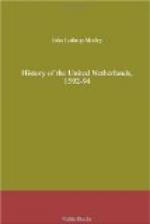And so Mayenne came to Brussels and passed three days with the archduke. “He avows himself ready to die in our cause,” said Ernest. “If your Majesty will give men and money enough, he will undertake so to deal with Bearne that he shall not think himself safe in his own house.” The archduke expressed his dissatisfaction to Mayenne that with the money he had already received, so little had been accomplished, but he still affected a confidence which he was far from feeling, “because,” said he, “it is known that Mayenne is already treating with Bearne. If he has not concluded those arrangements, it is because Bearne now offers him less money than before.” The amount of dissimulation, politely so-called, practised by the grandees of that age, to say nothing of their infinite capacity for pecuniary absorption, makes the brain reel and enlarges one’s ideas of the human faculties as exerted in certain directions. It is doubtful whether plain Hans Miller or Hans Baker could have risen to such level.
Feria wrote a despatch to the king, denouncing Mayenne as false, pernicious to the cause of Spain and of catholicism, thoroughly self-seeking and vile, and as now most traitorous to the cause of the confederacy, engaged in surrendering its strong places to the enemy, and preparing to go over to the Prince of Bearne.
“If,” said he, “I were to recount all his base tricks, I should go on till midnight, and perhaps till to-morrow morning.”
This letter, being intercepted, was sent with great glee by Henry IV., not to the royal hands for which it was destined, but to the Duke of Mayenne. Great was the wrath of that injured personage as he read such libellous truths. He forthwith fulminated a scathing reply, addressed to Philip II., in which he denounced the Duke of Feria as “a dirty ignoramus, an impudent coward, an impostor, and a blind thief;” adding, after many other unsavoury epithets, “but I will do him an honour which he has not merited, proving him a liar with my sword; and I humbly pray your Majesty to grant me this favour and to pardon my just grief, which causes me to depart from the respect due to your Majesty, when I speak of this impostor who has thus wickedly torn my reputation.”
His invectives were, however, much stronger than his arguments in defence of that tattered reputation. The defiance to mortal combat went for nothing; and, in the course of the next year, the injured Mayenne turned his back on Philip and his Spaniards, and concluded his bargain with the Prince of Bearne. He obtained good terms: the government of Burgundy, payment of his debts, and a hundred and twenty thousand crowns in hard cash. It is not on record that the man of his word, of credit, and of truth, ever restored a penny of the vast sums which he had received from Philip to carry on the business of the League.
Subsequently the duke came one very hot summer’s-day to Monceaux to thank the king, as he expressed it, for “delivering him from Spanish arrogance and Italian wiles;” and having got with much difficulty upon his knees, was allowed to kiss the royal hand. Henry then insisted upon walking about with him through the park at a prodigious rate, to show him all the improvements, while the duke panted, groaned, and perspired in his vain efforts to keep pace with his new sovereign.




